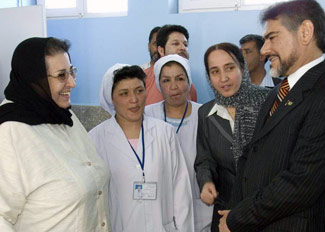Press release
Women's Well-being Key to Afghanistan's Future, UNFPA Leader Stresses
25 April 2007KABUL, Afghanistan — “No nation can be developed when women die while giving birth,” Thoraya Ahmed Obaid, Executive Director of UNFPA, the United Nations Population Fund, declared today in an appeal for increased international support for the well-being of Afghanistan’s women.
Mothers’ health was a key topic of discussion when Ms. Obaid met with President Hamid Karzai on Tuesday. The Afghan leader said that the country’s maternal death rate was unacceptably high, and thanked UNFPA for its help in addressing the crisis. Nearly one woman dies for every 60 live births in Afghanistan, and in some provinces the rate is four times higher.
President Karzai also voiced appreciation for the Fund’s support of the country’s first full census, scheduled for 2008. UNFPA is training Afghan staff, offering technical support and mobilizing funds for the effort, which aims to gather data vital to national planning and reconstruction.

This morning, on the third day of her four-day visit here, United Nations Under-Secretary-General Obaid joined Health Minister Dr. Sayed Mohammed Amin Fatemi in inaugurating a UNFPA-supported surgical facility at Malalai Hospital to treat women suffering from obstetric fistula. The devastating disability, a consequence of obstructed labour without timely medical assistance, is widespread in Afghanistan, but no treatment was available before now.
The causes of fistula and maternal death are the same: childbirth without skilled attendance or access to emergency obstetric care, too often and starting too young. Medical care is now more widely available in Afghanistan than five years ago, but there continues to be a critical shortage of female health providers. Along with partner agencies, UNFPA is helping to train midwives, and is supporting eight maternity hospitals in three remote provinces.
At a press briefing on Monday, Ms. Obaid said that birth spacing can “help mothers to become healthier, devote more attention to the child and help ensure that the mother doesn’t die when the child is born”. Emphasizing these benefits, she suggested, can lead to greater acceptance of family planning in a Muslim society like Afghanistan’s. UNFPA is assisting the Ministry of Public Health in promoting family planning, and has established a logistics system to ensure adequate supplies.
This afternoon, the UNFPA head took part in a panel on women’s rights, along with the Minister of Women’s Affairs, Husun Banor Ghazanfar, and others. She called for stronger efforts to counter violence against women by involving men in communities, sensitizing police officers and providing support for the victims.
Contact Information:
William A. Ryan
Cell Phone: +66 89 897 6984
Email: ryanw@unfpa.org
Omar Gharzeddine
Tel.: +1 (212) 297-5028
Email: gharzeddine@unfpa.org